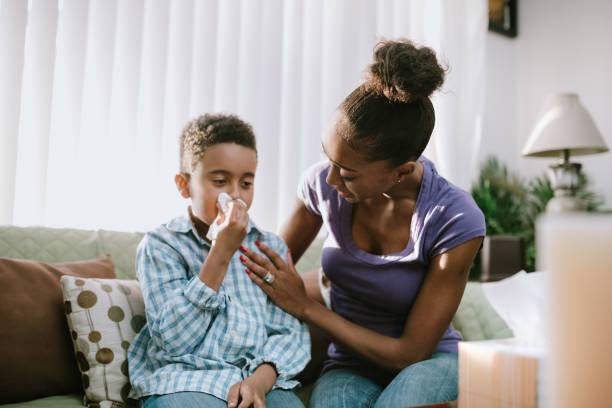
Safe Cough Remedies
Coughing is a common symptom in children, especially during cold and flu season thus take this Cough Remedies.
While it’s a natural way for the body to clear the throat and lungs, a persistent cough can be uncomfortable for kids and concerning for parents.
Over-the-counter medicines are not always recommended for young children, so many parents turn to natural, child-safe remedies to soothe their little ones.
Here’s a guide to some of the best cough remedies to help relieve a child’s cough naturally and effectively.
Honey The Natural Soother
Honey is a well-known remedy for coughs in children over one year old. It has antimicrobial properties and can soothe a sore throat, reduce coughing frequency, and improve sleep. Simply give your child a teaspoon of honey before bed, or mix it with warm water and lemon for added vitamin C. Avoid giving honey to children under one, as it can cause infant botulism.
Tip: For a warm, comforting drink, try a teaspoon of honey in a cup of warm chamomile tea, which also has soothing properties.
Steam Therapy
Steam is an excellent way to relieve coughs by loosening mucus in the airways. You can create a steam-filled bathroom by running a hot shower and letting your child sit in the steam for 10-15 minutes. For babies, holding them while sitting in a steamed bathroom can be effective.
Alternatively, a cool-mist humidifier can add moisture to the air, which helps keep the respiratory tract hydrated. Humidifiers are especially helpful at night to prevent dry air from irritating your child’s throat while they sleep.
Note: Always clean the humidifier regularly to prevent mold and bacteria buildup.
Hydration is Key
Keeping your child hydrated is crucial for thinning mucus, which makes it easier for the body to clear. Warm liquids like herbal teas (for older children), warm water, or broths can be soothing and help reduce throat irritation. For babies, breast milk or formula provides essential hydration.
Encourage your child to drink small amounts throughout the day to stay hydrated. Avoid caffeinated drinks, as they can lead to dehydration.
Saline Nasal Drops and Suction
If your child’s cough is related to a stuffy nose, saline nasal drops and suction can help. Saline drops help loosen mucus, making it easier to clear from the nasal passages. Use a nasal aspirator or bulb syringe for younger kids who can’t blow their nose yet. Clearing nasal congestion can reduce post-nasal drip, a common cause of cough in children.
Use a Cough-Relieving Chest Rub
For children over two, applying a vapor rub with eucalyptus or menthol to their chest can provide temporary relief from coughing. The cooling effect helps open up the airways and ease congestion. However, avoid applying it directly under the nose or on broken skin, as it may cause irritation.
You can also make a DIY chest rub using coconut oil and a few drops of diluted essential oils like eucalyptus or lavender (check age recommendations for essential oils first). Apply it gently to the child’s chest and back to help with nighttime congestion and cough.
Elevate Their Head While Sleeping
Elevating a child’s head can reduce coughing caused by post-nasal drip. For babies, placing a rolled towel under the crib mattress (never directly under the baby) can provide a slight incline. For older kids, adding an extra pillow can help.
When the head is elevated, mucus drains better and doesn’t settle in the throat, which may decrease nighttime coughing.
Ginger and Warm Water
Ginger has anti-inflammatory and antibacterial properties that can help relieve coughs. For children over two years, you can make ginger tea by boiling a few slices of fresh ginger in water. Once it cools slightly, add honey and lemon for extra soothing properties. This drink can help ease throat irritation and reduce coughing.
If your child doesn’t like the taste of ginger tea, you can mix a small amount of ginger juice with honey for a similar effect.
Encourage Rest
Rest is one of the best remedies for a child’s body to recover. Encourage quiet activities like reading, drawing, or watching a favorite movie. Ensuring your child gets plenty of sleep will allow their immune system to fight off infections more effectively.
When to See a Doctor
While these home remedies can be effective for mild coughs, it’s important to know when to seek medical advice. Call a doctor if:
- The cough lasts more than two weeks.
- Your child has difficulty breathing, chest pain, or wheezing.
- There is a high fever or other health symptoms of infection.
Final Thoughts
A child’s cough can often be treated at home with natural, soothing remedies. By keeping them hydrated, using steam therapy, and trying safe remedies like honey and ginger, you can help your child feel more comfortable. Remember, each child is different, so choose the remedies that work best for their age and preferences. With a little care and patience, your child will be on the road to recovery soon.
These natural remedies can provide relief, and adding them to your toolkit may help you handle coughs at home safely and effectively.






